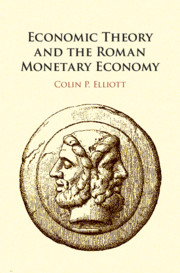Book contents
- Economic Theory and the Roman Monetary Economy
- Economic Theory and the Roman Monetary Economy
- Copyright page
- Dedication
- Contents
- List of Figures
- Preface
- Acknowledgments
- Chapter 1 On Writing Roman Economic History
- Chapter 2 Embedding Contexts of Roman Money
- Chapter 3 Evidence and Theory
- Chapter 4 Rationality, Purposefulness and Action
- Chapter 5 Money Quantity and Quality
- Chapter 6 Understanding Money Use and Value
- Conclusion
- Bibliography
- Index
Chapter 5 - Money Quantity and Quality
Published online by Cambridge University Press: 03 February 2020
- Economic Theory and the Roman Monetary Economy
- Economic Theory and the Roman Monetary Economy
- Copyright page
- Dedication
- Contents
- List of Figures
- Preface
- Acknowledgments
- Chapter 1 On Writing Roman Economic History
- Chapter 2 Embedding Contexts of Roman Money
- Chapter 3 Evidence and Theory
- Chapter 4 Rationality, Purposefulness and Action
- Chapter 5 Money Quantity and Quality
- Chapter 6 Understanding Money Use and Value
- Conclusion
- Bibliography
- Index
Summary
The assumptions built into the quantity theory of money severely limit its usefulness for studying the Roman monetary system if not all pre-industrial monetary systems. Quantity theory fails to account for the complexity and disaggregated nature of the Roman monetary economy. This chapter, instead, disaggregates the workings of the monetary system by considering both money quantity and quality, the spatial and temporal properties of money and, finally, money’s value as a product of the subjective preferences of individuals. Instead of assuming money is neutral, Roman economic historians can and should examine the specific channels through which money entered the Roman economy. Depending upon the location of these channels in the larger political, cultural and social matrix, as well as the amount of money distributed through them, it may be possible to understand the human responses to money supply changes in the Roman world as well as the wider effects of these changes – effects which include not only price movements and the shifts in the structure of production but also realignments in social hierarchies.
- Type
- Chapter
- Information
- Economic Theory and the Roman Monetary Economy , pp. 110 - 141Publisher: Cambridge University PressPrint publication year: 2020

